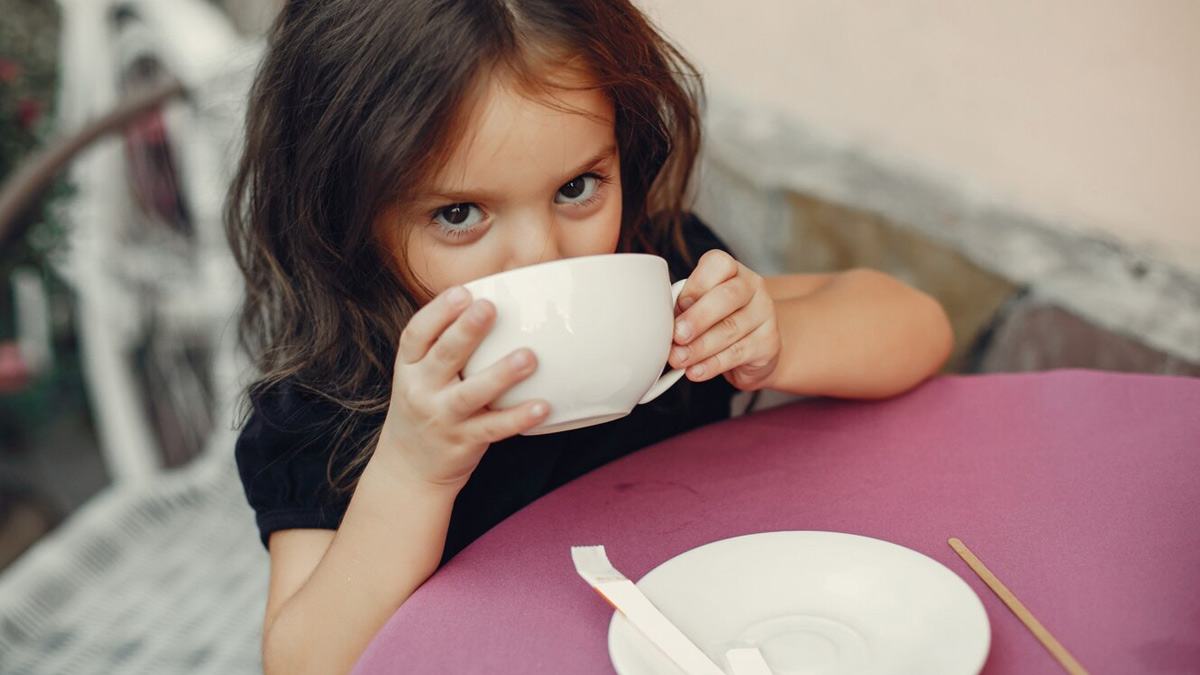
Many parents assume that a warm cup of tea is harmless for children, especially during coughs, colds, or upset stomachs. But tea isn’t just herbs and water. It contains caffeine, a stimulant that affects kids differently than adults. While adults can handle small doses, caffeine in tea can harm a child’s developing body, disrupting sleep, nutrient absorption, and even behaviour. With popular home remedies like adding tea leaves to milk, it’s time to ask, Is tea truly safe for children? Read ahead as an expert shares the risks of caffeine, healthier alternatives, and explains why experts warn against making tea a regular part of your child’s diet.
Table of Content:-
Why Do Parents Give Tea to Kids?
View this post on Instagram
Tea is often used as a quick fix for common childhood issues:
- Home remedies: Boiling tea leaves in milk to soothe coughs or loose motions.
- Cultural habits: Families sharing tea as a bonding ritual.
- Mistaken belief: Thinking herbal teas are ‘safe’ because they’re natural.
- But what many don’t realise is that even small amounts of caffeine can impact children’s health.
Dr Anuj Rastogi, Neonatal-Pediatrician, Tara Child Care, Meerut, warns: “Tea is not a good alternative for children. The caffeine in it stimulates the brain, delaying sleep, and it takes 10–12 hours to leave a child’s body that is much longer than the three to four hours for adults.”
ALSO READ: Are Hiccups Normal in Newborn Babies? What Every Parent Should Know
The Hidden Risks of Caffeine in Tea

- Nutrient absorption issues: “Tea reduces iron and calcium absorption,” says Dr Rastogi. Both are critical for growth and bone health.
- Sleep disruption: Caffeine keeps kids hyperactive, making bedtime battles worse.
- Dehydration: Tea acts as a diuretic, increasing urine output.
- Behavioural changes: Restlessness, irritability, or headaches in sensitive kids.
What Science Says About Caffeine and Kids
A 2022 study in Pediatrics & Child Health found that caffeine stays in a child’s system nearly 3x longer than in adults. Researchers noted that even 20–40 mg of caffeine (½ cup of tea) could disrupt sleep patterns and focus. A child’s liver isn’t fully developed to process caffeine quickly, leading to prolonged side effects.
Healthier Alternatives to Tea![tea alternatives for children 3 (52)]()
Skip the caffeine and try these nutrient-packed drinks instead:
- Turmeric milk (golden milk): Anti-inflammatory, aids immunity, and promotes sleep.
- Herbal infusions: Caffeine-free chamomile or peppermint tea (served lukewarm).
- Warm lemon-honey water: Soothes sore throats and boosts hydration.
- Fresh fruit smoothies: Rich in vitamins and fibre.
Dr Rastogi strongly recommends turmeric milk: “It’s a safer remedy for coughs and provides calcium without caffeine’s downsides.”
When Is Tea Okay for Children?
If you occasionally offer tea:
- Choose herbal: Ensure it’s 100% caffeine-free (e.g., rooibos, ginger).
- Dilute it: Mix 1 part weak tea with 2 parts milk or water.
- Avoid adding sugar: Excess sugar harms teeth and energy levels.
ALSO READ: Why Do Babies Put Everything in Their Mouths? Expert Shares When Do Babies Start Mouthing
Conclusion
Tea might seem like a comforting drink for kids, but the caffeine in it can cause more harm than good. It disrupts sleep, affects nutrient absorption, and stays in their tiny bodies much longer than in adults. Instead of tea, try healthier options like warm turmeric milk or caffeine-free herbal teas. These choices keep kids hydrated and nourished without the unwanted side effects. Small changes in their drinks can make a big difference in their health and energy levels. Always check labels and avoid caffeine for young children. Stick to simple, natural drinks for happy, healthy kids.
Also watch this video
Read Next
Fostering A Positive Relationship With Food: Tips For Parents Of Children With Disordered Eating
How we keep this article up to date:
We work with experts and keep a close eye on the latest in health and wellness. Whenever there is a new research or helpful information, we update our articles with accurate and useful advice.
Current Version
-1744193305229.jpg)